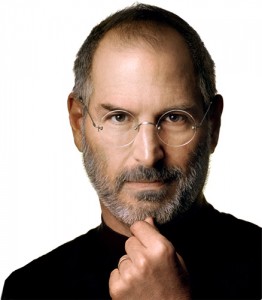
Alex Gibney’s Steve Jobs documentary is available now in some theaters, on Amazon Instant Video and, ironically, on iTunes. It’s a film that purports to figure out what made Steve Jobs tick. And it does a lot, just not that.
I’m not a dispassionate reviewer here. More than a year before Jobs died I tried to hire Alex Gibney to make a Steve Jobs film with me. At that point he suggested I be the director, that he’d coach me ("It’s not that hard", the Oscar-winner claimed.) We talked and met but didn’t come to a deal. Later Gibney decided to do a Jobs film on his own -- this film -- and he came to me for help. We talked and met but again didn’t come to a deal. Nothing is unusual about any of this, but it made me eager to see what kind of movie he would make and how it would compare to the one I originally had in mind.
Now some of you may recall that I did a Steve Jobs film -- The Lost Interview -- also released by Magnolia Pictures, the company showing Gibney’s movie. But my Jobs film was an accident, a stroke of good fortune, a documentary shot in 69 minutes and brought to the screen for under $25,000 including digital restoration and publicity. Gibney’s movie cost $2 million to make.
And the money shows on the screen. Gibney is a very skilled documentary director surrounded by a staff of the best professionals in the business. The film is beautifully shot and the audio is spectacular, too. Even where the audio is bad it is deliberately bad -- for effect. You can hear Gibney asking questions from off camera. You can hear me asking questions, too, because about two minutes of the film were taken from my film, for which my partners and I were paid.
There aren’t very many interviews in the film but the ones he has are good, especially Chrisann Brennan (Lisa’s mother), a very sweet Dan Kottke, and hardware engineer Bob Belleville. All the interviews are excellent but those three stood out for me.
In a documentary film the thing you want most to get and hardly ever do is a moment of true emotion and Bob Belleville’s crying while talking about the passing of this man who he also says ruined his life, well that’s one of those moments. I wish the film had ended right there, around 45 minutes in.
But it didn’t end there.
The last 40 minutes or so are a succession of negative items that are all true -- backdated stock options, Foxconn employee suicides, corporate tax avoidance, Apple bullying the press, and the ingenuous way Apple treated the news of Steve’s health -- the health of the CEO of a major public company. All these events involved Steve and represented aspects of his personality, but they felt to me while watching the movie like two influences were in effect: 1) the need to get in as much material as possible (this would be, after all, Gibney’s only-ever film on the topic), and; 2) it was a CNN Films co-production and therefore had to have some element of journalism, not just be a tone poem to narcissism.
So the film is 20 minutes too long. And by the time you get to the end and swing back to the central idea that Gibney is personally trying to figure out Steve Jobs (Gibney is the film’s narrator, not just the guy asking questions from off camera) he doesn’t really come to anything like a conclusion.
This is funny given our earlier discussions back in New York about the Walter Isaacson authorized biography of Jobs that we had both thought was kind of a snow job. At the end of that book Isaacson had pretty much thrown up his hands saying that Steve was "complicated" and therefore beyond understanding.
Steve certainly was complicated, but I expected more of a conclusion from Gibney, a sense of really coming to terms with Steve.
Ultimately Steve Jobs wasn’t the man in the machine, he was the machine. And the mourning for Steve that so confused Gibney, because he saw Jobs as a very unlovable character, was mourning for a passing age as much as a man. After that the iPhone became a phone, Apple became a company, and technology pretty much lost any pretense of character.
And Captain Hook was dead.

